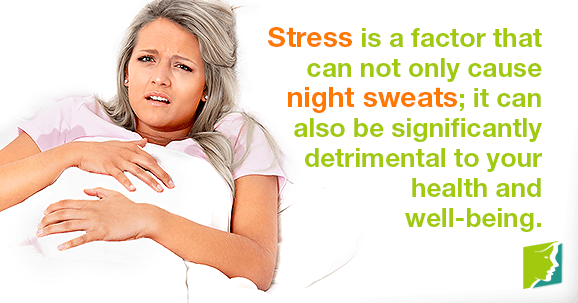Nocturnal hyperhidrosis, also known as night sweating, is an affliction that around 70% of women will experience at some point in their lifetime. It is characterized by a person waking during the night to find themselves covered with sweat. Night sweats are often symptomatic of significant issues or changes in the body, and can be associated with menopausal changes, fevers, blood sugar levels, or some medications. Sometimes, stress can trigger or intensify night sweats.
How Does Stress Trigger Sweating?
Stress can lead to nocturnal hyperhidrosis in two ways: as a condition in itself, or as a symptom of other conditions.
Stress comes about when a person is consistently worried about matters in their personal or professional life. These could include concerns about work, financial problems, family issues, or personal anxieties, to name a few. Regular worrying causes a fluctuation in hormone levels, which triggers the hypothalamus (i.e., the body's inner thermostat) to warm the body, and then produce sweat to cool down. This could occur during the day, but is more common nocturnally, because this is when a person has more time to focus on their anxieties away from the distraction of daily activities.
Problematically, other conditions or changes in the body of which night sweating is a symptom can also cause stress, and therefore exacerbate nocturnal sweating. For example, hormonal changes that occur as a woman approaches menopause instigate a variety of responses in the body, such as mood swings, loss of libido, and weight gain - factors which can cause stress, and therefore lead to nocturnal hyperhidrosis. Similarly, the experience of night sweating itself can impede your ability to achieve a restful night's sleep, which may heighten stress levels and intensify sweats. Read about habits that trigger night sweats.
How Can I Prevent Stress from Leading to Night Sweats?
It is important to deal with the cause of stress to reduce the night sweats they invoke and boost your emotional well-being. It is likely that you are aware if you are suffering as a result of stress because of how you are feeling in yourself, but other indicators to look out for could be difficulty sleeping, inability to relax, increased or decreased appetite, headaches, or difficult concentrating.
If you sense that the cause of stress is temporary or manageable, simply taking some time to unwind and enjoy yourself on a daily bases could considerably reduce your stress levels and enhance your well-being. This could mean undertaking any activity that brings you joy, from walking the dog to meditation, relaxing in front of the television, or taking part in a yoga class.
If your anxiety is significantly persistent and life-impeding, those around you have expressed concern, or you are having suicidal thoughts, you may be suffering with severe anxiety or depression, and it is advisable to arrange to talk with either a doctor, counselor, or loved one to discuss the options available. Though it is difficult to take the first steps to acknowledge you are struggling and to ask for help, it's important to remember that anxiety and depression are illnesses and - like any other illness - can be treated.
Though night sweats are an unpleasant symptom, remember that they are just that - a symptom - and what's important is to address the condition your night sweats are symptomizing to ensure sound health and well-being - and stress can be significantly detrimental to these. Preventing night sweats by reducing stress may be emotionally challenging, but remember that there are people to help you; you are not alone.
Sources
- The American Institute of Stress. (n.d). 50 common signs and symptoms of stress. Retrieved February 12, 2014, from http://www.stress.org/stress-effects/
- National Health Service. (2012). Night sweats. Retrieved February 12, 2014, from http://www.nhs.uk/conditions/night-sweats/Pages/Introduction.aspx




